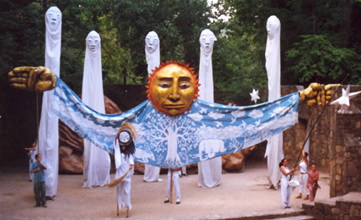The Bridges of Madison County is a title familiar to millions, first from the huge 1992 bestselling novel by Robert James Walker about star-crossed lovers and subsequently from Clint Eastwood’s popular 1995 film adaptation with Meryl Streep.
In 2013, composer/lyricist Jason Robert Brown and scriptwriter Marsha Norman brought their considerable talents to bear on the highly romantic story, producing a Broadway musical that won a Tony Award for Best Original Score but ran only three months after mixed reviews. Theatre Raleigh‘s intimate staging and nigh-perfect casting go a long way in minimizing the musical’s imperfections, while demonstrating the reason the company is one of the Triangle’s most reliable and respected.
The central storyline in all three iterations of Bridges is the chance meeting in 1965 between Italian-born Francesca, an Iowa farmer’s war-bride and now a disillusioned housewife, and loner Robert, a world-roving National Geographic photographer, come to Madison County to take pictures of its notable covered bridges. When he stops at Francesca’s farmhouse to ask directions, the attraction is instant. With her husband and children away at a state fair for four days, an intense affair ignites. On the day Francesca’s family is to return, Robert asks her to go away with him for a new life together, a tempting offer that Francesca must weigh with the hurt it will incur.
While the novel was pummeled by critics as overly sentimental and clichéd, the movie was credited for being richer and more layered. The musical falls somewhere between these two, with scenes of genuine emotion alongside others with stereotypical soap opera dialogue; some songs movingly express the joys and doubts of romantic involvement alongside others in bland, Broadway anthem style and we-need-a-song-here mode.
Key to Theatre Raleigh’s successful production is the talent and chemistry of its two leads, each with multiple New York and national tour credits. At the opening, Patrick Oliver Jones made Robert’s decency and respect come across believably when fighting his sudden passion for Francesca, knowing the damage it could cause both. He played the character’s awkwardness naturally, as he did Robert’s opening himself to love again. Jones’ strong vocals made his songs near-showstoppers in their sincerity and control, whether quietly introspective or stirringly intense.
Janine Divita gave Francesca down-to-earth warmth and unaffected charm, convincingly hesitant to become involved with Robert and then affectingly bold in making sure it happens. Divita was particularly adept at projecting Francesca’s conflicting emotions with facial expressions and matched Jones’ vocal prowess in their powerful love duets. She made the most of the show’s final number in which Francesca reflects on what she lost and what she gained in those four blissful days.
Brown’s songs for Robert are more individual and engaging than those for Francesca, which are further hampered by their extreme range, requiring sudden high notes at odds with Francesca’s otherwise more earthy register. Nevertheless, whenever Jones and Divita were on stage, the show soared. Songs for other characters, including Francesca’s husband, her children, her neighbors, and singers on the radio, were generally predictable character numbers or obvious filler pieces.
Scott Wakefield made Francesca’s husband, Bud, a sympathetic character, not allowing him to be the villain of the piece, but a loving spouse who doesn’t express that love as often as he should. What seemed at first to be a sitcom-type neighbor couple, Charlie (Jason Sharp) and Marge (Heather Setzler), was saved by their natural comedy and loving relationship. Their extended bickering around the kitchen table concerning the goings-on with Robert and Francesca was one of the show’s highlights.
As Francesca’s children, Callie Colvard and Jack Russell Richardson were typical sibling rivals, squabbling and teasing, the script giving them little else to do until a fast-forwarded maturing into adults near the show’s end. Special kudos go to Supriya Jaya, who played a dizzying number of waitresses, barkeeps, sales clerks, and secretaries, individualizing so well, it was hard to tell they all came from one actor.
Director Lauren Kennedy Brady kept the proceedings simple and direct, the staging flowing easily from one scene to the next. There were several cleverly staged sections in which two scenes where taking place simultaneously and others that made use of the audience aisles. These were aided by Rebecca Leigh Johnson’s two-tiered setting of weathered wooden columns, platforms, stairs, accommodating kitchen, porch, and bedroom. Only the narrow spaces between some of the columns made for awkward entrances and exits. Many scenes took place on a large, open platform, with the audience seated on three sides.
Erich Keil‘s lighting was notable for its sunny warmth, cool night atmosphere, and subtle spotlighting of significant moments. Dorothy Austin-Harrell‘s authentic-looking, well-worn country garb and Elizabeth Newton’s numerous period props added further farmland ambiance.
Musical director Nathan Thomas guided the singers and led his eight-piece orchestra (atop the set’s upper level) from backstage via TV monitor set above the audience, somewhat distractingly visible by those seated on the two longer sides. The orchestra was rather heavily miked, such that it was in competition with the singers in the louder numbers, made worse by its tinny, canned sound. Perhaps sound designer Eric Alexander Collins will have adjusted the problem by now. Otherwise, the miking for the dialogue worked fine, except for Janine Divita’s Italian accent, which, despite sounding authentic, was too highly inflected for total clarity.
The romantic fantasy of the tall, dark stranger sweeping away the shy maiden is deeply ingrained into centuries of storytelling, so many in Wednesday’s audience were wiping away tears and stifling sniffles by show’s end. But even if you don’t buy into that plot device, Theatre Raleigh’s professionalism and the material’s best moments make the production easily recommended.
The Bridges of Madison County continues through Sunday, August 18. For more details on this production, please view the sidebar.











